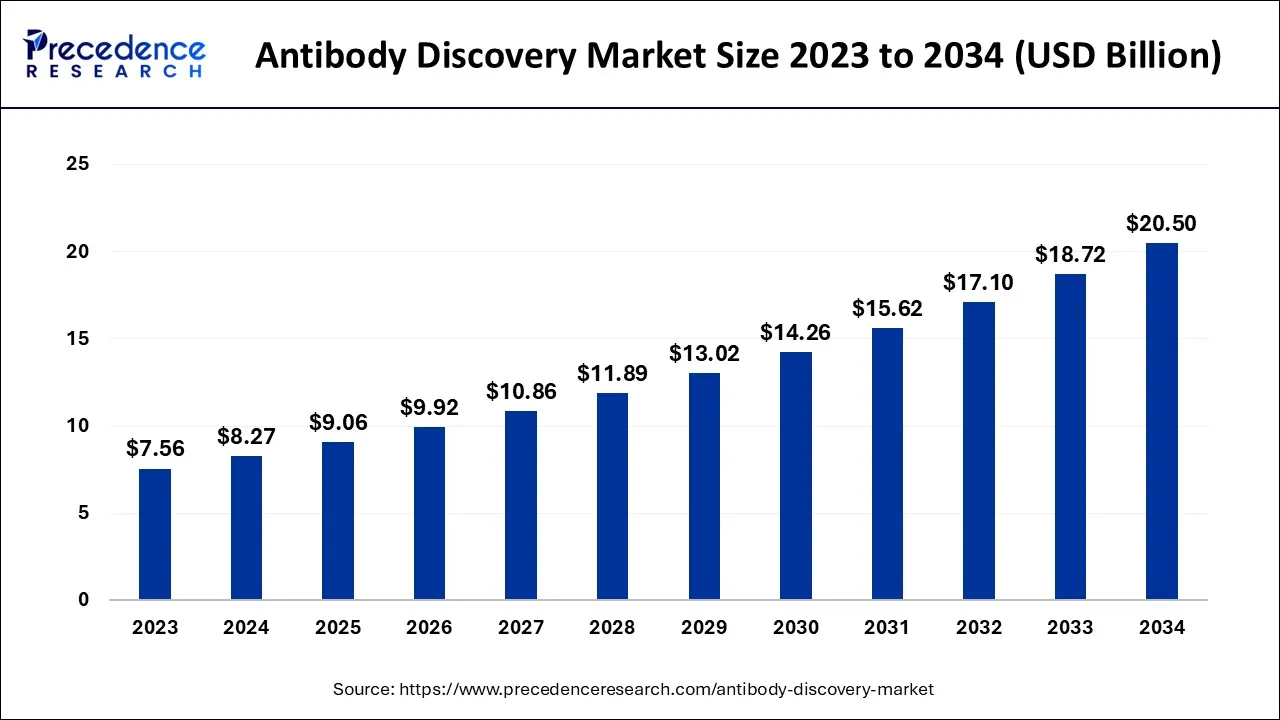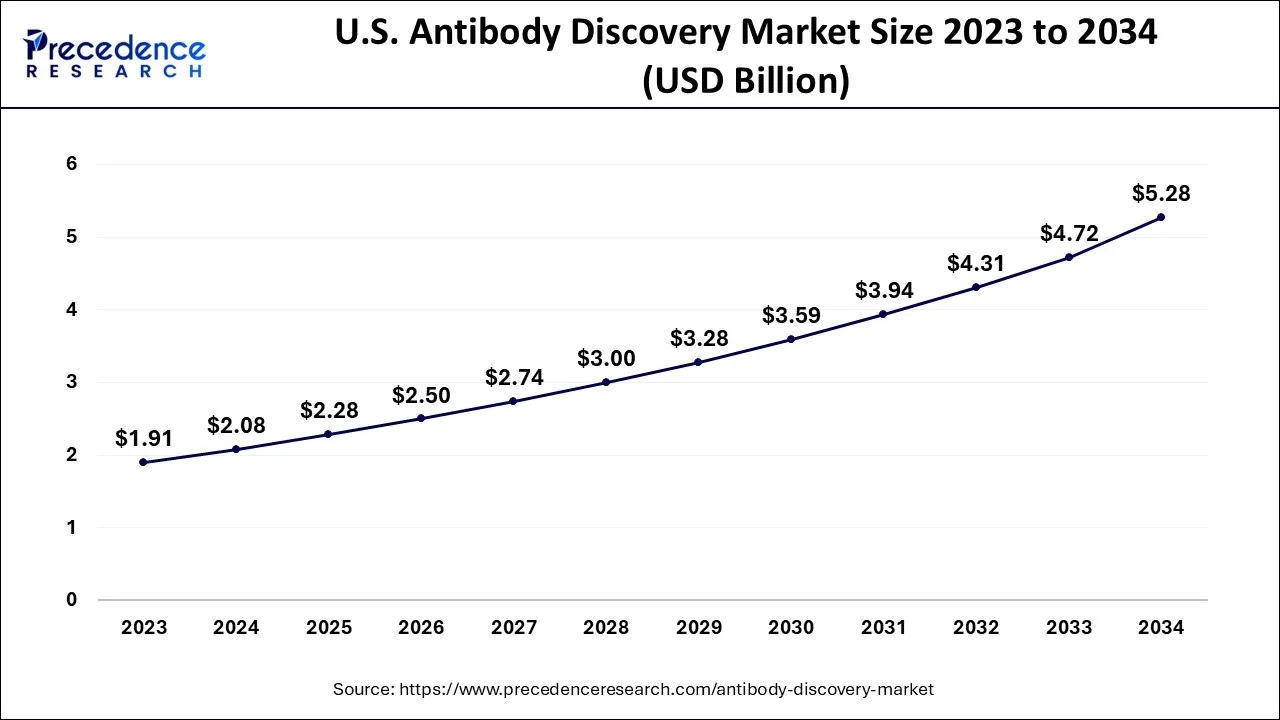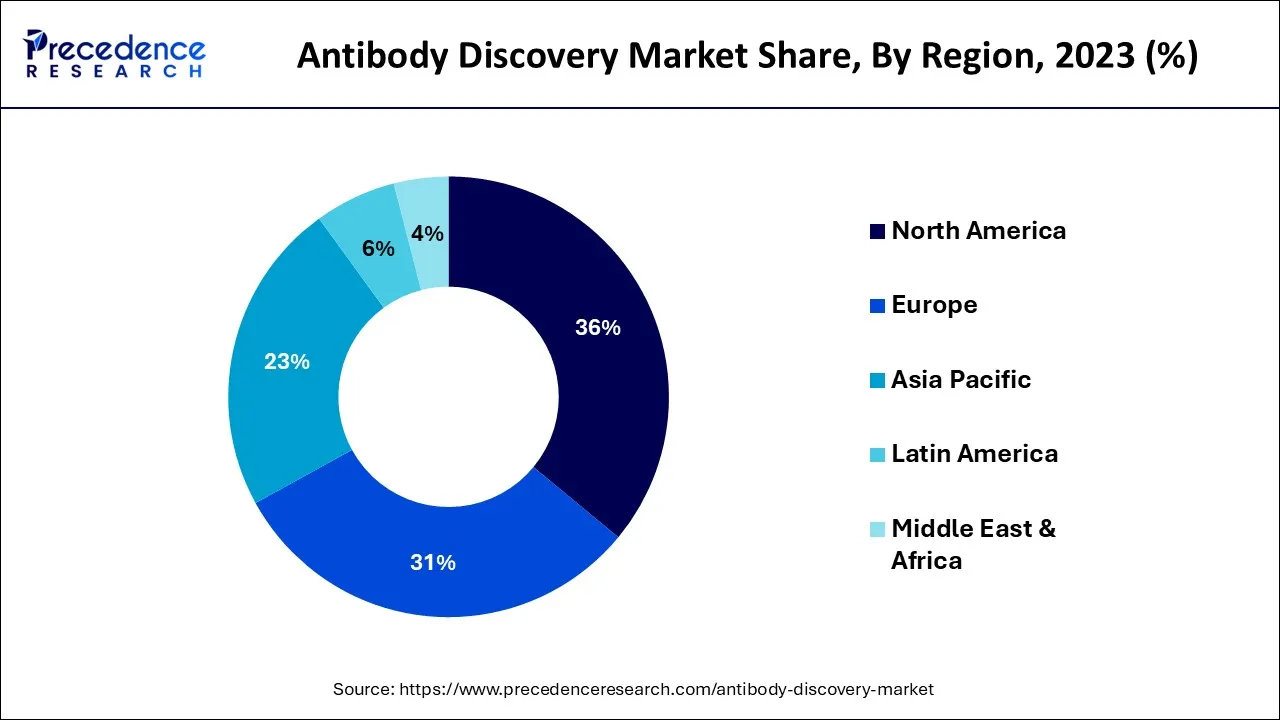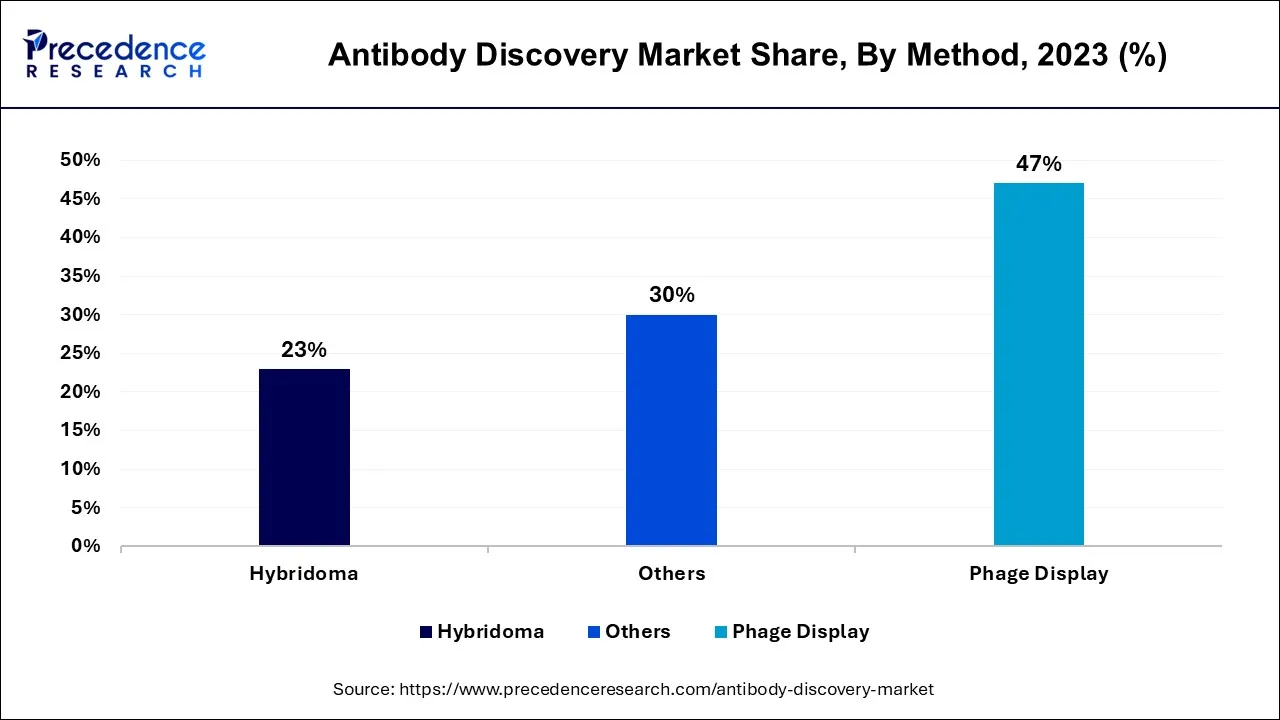November 2023
The global antibody discovery market size is predicted to increase from USD 8.27 billion in 2024, grow to USD 9.06 billion in 2025, and is anticipated to reach around USD 20.50 billion by 2034, poised to grow at a CAGR of 9.5% between 2024 and 2034. The North America antibody discovery market size is calculated at USD 2.98 billion in 2024 and is estimated to grow at the fastest CAGR of 9.65% during the forecast year.
The global antibody discovery market is expected to be valued at USD 8.27 billion in 2024 and is anticipated to reach around USD 20.50 billion by 2034, expanding at a CAGR of 9.5% over the forecast period from 2024 to 2034.

The U.S. antibody discovery market size is accounted for USD 2.08 billion in 2024 and is projected to be worth around USD 5.28 billion by 2034, poised to grow at a CAGR of 9.73% from 2024 to 2034.

North America has held the largest revenue share of 36% in 2023. North America dominates the antibody discovery market due to several key factors. The region boasts a robust biotechnology and pharmaceutical industry, housing numerous major players and research institutions at the forefront of antibody development. Additionally, North America enjoys substantial funding for research and development, a well-established regulatory framework, and a supportive investment climate.
The presence of cutting-edge technology, a skilled workforce, and a strong focus on healthcare innovation further contribute to its leadership. These factors collectively position North America as a major hub for antibody discovery, driving its substantial market share in the global landscape.

Asia-Pacific is estimated to observe the fastest expansion with the highest CAGR of 8.3% during the forecast period. Asia-Pacific has gained substantial growth in the antibody discovery market due to several compelling factors. The region's rapidly expanding biotechnology and pharmaceutical industries, coupled with a burgeoning healthcare infrastructure, create a favorable environment for antibody research and development. Additionally, lower operational costs, skilled scientific talent, and government initiatives promoting biotech innovation attract global players.
Furthermore, Asia-Pacific's vast and diverse patient population offers opportunities for clinical trials and personalized medicine, driving the demand for antibody-based therapies. Overall, the region's economic growth, research capabilities, and market potential have positioned it as a major player in the antibody discovery market.
The antibody discovery market is a dynamic and rapidly evolving sector within the biotechnology and pharmaceutical industries. It encompasses various techniques and technologies aimed at identifying and developing antibodies for therapeutic, diagnostic, and research applications. Key players in this market include biotechnology companies, contract research organizations, and academic institutions, all striving to create novel antibodies that target specific diseases or biomarkers.
Advances in high-throughput screening, phage display, hybridoma technology, and artificial intelligence-driven approaches have propelled innovation in antibody discovery, making it a crucial field for drug development, personalized medicine, and diagnostics. The market continues to expand as demand for antibody-based therapeutics and diagnostics grows.
The antibody discovery sector, situated at the convergence of biotechnology and pharmaceuticals, is surging with vitality. It revolves around the exploration and creation of antibodies, pivotal molecules with a wide range of applications in therapeutics, diagnostics, and research. This market is characterized by a diverse array of participants, encompassing biotech enterprises, contract research organizations, and academic institutions, all driven by the aspiration to innovate and formulate antibodies tailored for specific diseases or biomarkers.
An assortment of advanced methodologies, spanning high-throughput screening to AI-infused approaches, has catalyzed groundbreaking revelations in antibody development, establishing it as a pivotal domain for drug advancement, personalized medicine, and diagnostic applications. With the swelling demand for antibody-based therapeutics and diagnostics, the market is experiencing rapid and expansive growth.
Several pivotal trends and growth catalysts are actively molding the landscape of the antibody discovery market. A prominent impetus is the escalating prevalence of chronic ailments, such as cancer, autoimmune conditions, and infectious diseases. As the necessity for precisely targeted treatments escalates, so does the call for customized antibodies. Furthermore, the evolution of technologies such as phage display, hybridoma technology, and bioinformatics has streamlined the process of antibody discovery, curtailing development timelines and expenses. This has captivated substantial investments from both established pharmaceutical entities and entrepreneurial startups, further igniting the fire of market expansion.
Notwithstanding its promising prospects, the antibody discovery market grapples with its share of impediments. One primary challenge lies in the intricate nature of antibody development, which often necessitates substantial temporal and financial resources. Additionally, the labyrinthine regulatory framework governing antibody-based therapeutics demands stringent clinical testing and authentication. The market is fiercely competitive, featuring a multitude of contenders vying for a piece of the burgeoning demand. Furthermore, the rapid pace of technological progression necessitates perpetual adaptation and the continual injection of resources into research and development endeavors.
Amid these challenges, numerous enticing business prospects beckon within the antibody discovery realm. Collaborations and partnerships between biotech firms and academic research hubs present avenues for the amalgamation of knowledge and assets, expediting the development process. Diversification into specialized markets, such as personalized medicine and companion diagnostics, provides opportunities for distinction and expansion.
Harnessing the power of artificial intelligence and machine learning to dissect extensive datasets can enhance antibody discovery endeavors, elevating the efficiency and triumph rate of candidate identification. Finally, broadening the utilization of antibodies beyond their conventional therapeutic roles to encompass diagnostics and research tools showcases the potential for market augmentation and diversification.
In synthesis, the antibody discovery market is a dynamic and promising domain propelled by the demand for precise and individualized therapies. Despite obstacles, the evolution of technology and the surge in investment prospects render it a vibrant sphere with ample growth potential, offering myriad avenues for originality and cooperation.
| Report Coverage | Details |
| Growth Rate from 2024 to 2034 | CAGR of 9.5% |
| Market Size in 2024 | USD 8.27 Billion |
| Market Size by 2034 | USD 20.50 Billion |
| Largest Market | North America |
| Base Year | 2023 |
| Forecast Period | 2024 to 2034 |
| Segments Covered | By Methods, By Antibody Type, and By End Users |
| Regions Covered | North America, Europe, Asia-Pacific, Latin America, and Middle East & Africa |
Biologics and immunotherapy
Biologics and immunotherapy play pivotal roles in propelling the growth of the antibody discovery market. Biologics, encompassing monoclonal antibodies and protein-based therapeutics, have exhibited remarkable efficacy in treating a broad spectrum of ailments, ranging from cancer to autoimmune conditions. This success has engendered a mounting demand for novel antibodies custom-tailored to target specific disease markers.
Immunotherapy, a subset of biologics, has ushered in a paradigm shift in cancer treatment, mobilizing the body's own immune defenses against tumors. Notable examples include immune checkpoint inhibitors and CAR-T cell therapies, both heavily reliant on antibodies. This groundbreaking achievement has spurred fervent exploration into the development of fresh antibodies capable of modulating immune responses and amplifying the potency of immunotherapy.
The synergy between biologics and immunotherapy establishes fertile ground for antibody discovery. Researchers are actively seeking antibodies designed to home in on precise antigens found on cancer cells, obstruct immune checkpoints, or incite robust immune reactions against pathogens. This relentless pursuit of innovation and the creation of more efficacious biologics and immunotherapies propel investments, foster collaborative efforts, and drive advancements in antibody discovery techniques, ultimately catalyzing the expansion of the market.
In essence, the triumphs of biologics and immunotherapy affirm the indispensable role of antibodies in contemporary healthcare, rendering antibody discovery an ever-evolving and thriving domain.
Antigen identification challenges
Antigen identification challenges pose a significant restraint on the growth of the antibody discovery market. The process of identifying suitable disease-specific antigens, which antibodies are designed to target, is often intricate and time-consuming. In cases of diseases with complex biology or limited known targets, researchers may struggle to pinpoint the right antigens, causing delays in the initiation of antibody discovery projects.
Furthermore, the absence of clearly defined antigens can hinder the development of highly specific antibodies, potentially resulting in off-target effects and diminished therapeutic effectiveness. This issue is particularly pronounced in diseases like certain cancers and infections, where the identification of distinct and accessible antigens can be a formidable endeavor.
Additionally, antigen identification challenges can increase the risk of project failure, as investing substantial resources into antibody development without a clear antigen target can lead to unsuccessful outcomes. Overcoming these challenges often requires innovative approaches, such as leveraging omics technologies and advanced screening methods, to enhance the identification and validation of relevant antigens, ultimately driving progress in the antibody discovery field.
Expanding therapeutic applications
Expanding therapeutic applications are creating substantial opportunities within the antibody discovery market. The remarkable versatility of antibodies as therapeutic agents has led to their adoption in a wide range of medical fields, including oncology, autoimmune diseases, infectious diseases, and more. As our understanding of disease mechanisms deepens, novel targets and treatment modalities are continually emerging, driving demand for antibodies tailored to address these evolving therapeutic needs. For example, the development of antibodies directed at specific cancer biomarkers has ushered in a transformative era in oncology treatment, promising more precision and efficacy.
In autoimmune ailments, antibodies designed to regulate immune responses hold potential for managing conditions like rheumatoid arthritis and multiple sclerosis. Moreover, as rare diseases gain more attention, antibody discovery provides an avenue to address unmet medical needs in these niche markets. Expanding therapeutic applications not only broaden the scope of antibody discovery but also offer the opportunity to improve patient outcomes and quality of life, making this field an exciting and dynamic space for research, innovation, and commercialization.
According to the methods, the phage display segment has held 47% revenue share in 2023. The phage display segment commands a significant share in the antibody discovery market primarily due to its robust and adaptable nature in generating diverse antibody libraries. This technique's strength lies in its capacity to showcase antibody fragments on phage surfaces, allowing for the screening of an extensive pool of potential candidates targeted at specific antigens. Phage display's capability to produce high-affinity antibodies applicable across various domains, including therapeutics, diagnostics, and research tools, has positioned it as a preferred method. Furthermore, it excels in discovering antibodies tailored for complex targets, further solidifying its dominant role within the antibody discovery sector.

The hybridoma segment is anticipated to expand at a significantly CAGR of 10.7% during the projected period. The hybridoma sector retains a substantial growth of the antibody discovery market due to its well-demonstrated ability to produce monoclonal antibodies characterized by exceptional specificity. This technology offers versatility in targeting a diverse spectrum of diseases, rendering it applicable to a wide array of therapeutic and diagnostic uses. Furthermore, the long-standing credibility and reliability of hybridoma-based antibodies make them the preferred choice for scientists and pharmaceutical entities. Despite the emergence of newer methodologies such as phage display and recombinant DNA techniques, hybridoma technology's established track record and unwavering success continue to underpin its prominent growth in the antibody discovery landscape.
In 2023, the human antibody segment had the highest market share of 49% on the basis of the antibody type. The dominance of the human antibody segment in the antibody discovery market can be attributed to its substantial market share, primarily driven by several advantages. Human antibodies, originating from the human immune system, exhibit enhanced safety profiles, reduced immunogenicity, and increased efficacy.
Their compatibility with human targets enhances therapeutic effectiveness while minimizing the risk of adverse immune reactions. This segment's prominence aligns with the surging demand for personalized medicine, emphasizing individualized treatment approaches. Additionally, regulatory bodies often favor human antibodies due to their favorable safety profiles, further solidifying their significant presence in the antibody discovery market.
The murine antibody segment is anticipated to expand at the fastest rate over the projected period. The murine antibody segment holds a major share in the antibody discovery market due to its historical prominence and established research infrastructure. Murine antibodies, derived from mice, have been widely used in research and therapy development for decades, resulting in a wealth of knowledge and available resources. While humanized and fully human antibodies offer advantages in terms of reduced immunogenicity, murine antibodies are still valuable for initial screening and research phases. Their well-documented performance and familiarity have contributed to their continued dominance in the market, alongside ongoing efforts to enhance their utility through engineering techniques.
In 2023, the pharmaceutical and biotechnology industry segment had the highest market share of 41% on the basis of the end users. The pharmaceutical and biotechnology industry holds a significant share in the antibody discovery market due to its substantial research and development investments, extensive infrastructure, and expertise in drug development. These companies have the resources to fund antibody discovery programs and navigate the complex regulatory pathways for new therapies. Furthermore, they recognize the potential of antibodies as effective treatments for various diseases, driving continuous innovation. Their ability to commercialize antibody-based drugs and therapies positions them as major players in the market, contributing to their dominant share in the antibody discovery sector.
The academic laboratory segment is anticipated to expand at the fastest rate over the projected period. The academic laboratory segment holds significant growth in the antibody discovery market due to several key factors. Academic institutions often possess cutting-edge research capabilities, access to diverse expertise, and funding for innovative projects. They foster a collaborative environment conducive to groundbreaking discoveries and offer opportunities for interdisciplinary research.
Additionally, academia is instrumental in basic research, target identification, and early-stage antibody development, which can lead to novel therapeutic candidates. This segment's contributions not only advance scientific knowledge but also play a pivotal role in driving innovation and shaping the future of antibody-based therapies.
Segments Covered in the Report
By Methods
By Antibody Type
By End Users
By Geography
For inquiries regarding discounts, bulk purchases, or customization requests, please contact us at sales@precedenceresearch.com
No cookie-cutter, only authentic analysis – take the 1st step to become a Precedence Research client
November 2023
September 2024
October 2024
July 2024